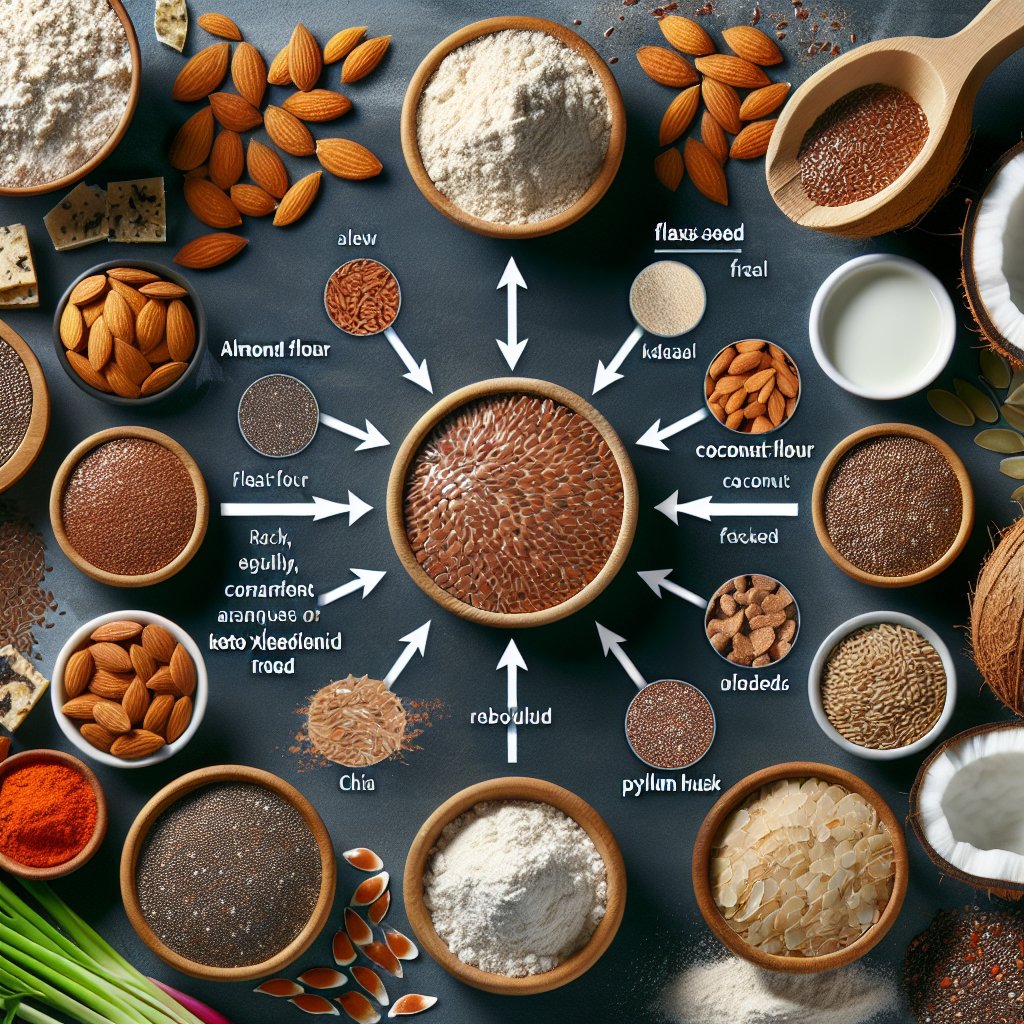Unleash the Power of Flaxseed Meal: Transform Your Keto Diet with This Secret Ingredient!
Unleash the Power of Flaxseed Meal: Transform Your Keto Diet with This Secret Ingredient!
Brief Explanation of Flaxseed Meal and Its Benefits
Before we dive into the incredible world of flaxseed meal and its role in the ketogenic diet, let’s understand what flaxseed meal actually is. Flaxseed meal is simply ground flaxseeds, and it’s a wonderful source of essential nutrients such as omega-3 fatty acids, fiber, and protein. These tiny, powerful seeds have been used for centuries for their health benefits, and in the form of flaxseed meal, they are incredibly versatile and easy to incorporate into your daily meals.
When it comes to the benefits of flaxseed meal, there’s so much to love. Firstly, it’s a fantastic source of heart-healthy omega-3 fatty acids, which are essential for overall well-being. The high fiber content of flaxseed meal can also aid in digestion and help keep you feeling full and satisfied for longer periods, making it a great addition to a ketogenic lifestyle. Additionally, the protein and lignans found in flaxseed meal provide even more reasons to include this superfood in your diet.
Introduction to the Ketogenic Diet and Its Popularity
Now, let’s talk about the ketogenic diet and why it has taken the health and wellness world by storm. The ketogenic diet, or keto diet for short, is a low-carbohydrate, high-fat diet that offers various health benefits. It has gained immense popularity for its ability to help individuals achieve weight loss, improve metabolic health, and even provide mental clarity and focus.
At the core of the ketogenic diet is the concept of entering a state of ketosis, where the body shifts from using glucose as its primary fuel source to utilizing fats for energy. This metabolic state not only aids in weight loss but also has been linked to improved blood sugar control and enhanced mental performance.
One of the key factors that make the ketogenic diet so effective is its focus on high-quality, nutrient-dense foods. This is where flaxseed meal comes into play – as a powerhouse of essential nutrients, it perfectly complements the keto diet by providing a wide range of health-boosting properties without compromising the macronutrient profile required for ketosis.
Together, flaxseed meal and the ketogenic diet form a winning combination for those looking to optimize their health and well-being.
In the next section, we will delve deeper into how flaxseed meal can be seamlessly integrated into your keto lifestyle, offering a myriad of delicious and nutritious options to elevate your meals and snacks!

Health Benefits of Flaxseed Meal on Keto Diet
So, you’ve heard about the wonders of flaxseed meal and how it can enhance your ketogenic diet, but what exactly makes it so special? Let’s dive into the specific health benefits of incorporating flaxseed meal into a keto lifestyle and why it’s a must-have ingredient.
High Fiber Content
First things first, let’s talk about the incredible fiber content of flaxseed meal. Just 2 tablespoons of flaxseed meal provide an impressive 4 grams of fiber. Why does this matter? Well, on a keto diet, where the focus is on low carb intake, getting enough fiber can sometimes be a challenge. Fiber not only keeps your digestive system happy and healthy but also plays a vital role in supporting weight management. It helps you feel fuller for longer, which is particularly beneficial when you’re working towards weight loss goals on the keto diet.
Omega-3 Fatty Acids
Now, let’s explore the omega-3 fatty acids found in flaxseed meal. Omega-3s are renowned for their anti-inflammatory properties and their positive impact on heart health. Incorporating flaxseed meal into your keto diet allows you to boost your omega-3 intake without consuming fish or fish oil supplements. This is particularly beneficial for individuals who follow a plant-based or vegetarian keto diet. Omega-3 fatty acids are essential for brain function, skin health, and overall well-being, making flaxseed meal a valuable addition to your daily meals.
Role in Promoting Weight Loss
Flaxseed meal also plays a significant role in promoting weight loss on a ketogenic diet. The combination of high fiber content and omega-3 fatty acids can work synergistically to support your weight management efforts. The fiber aids in creating a sense of fullness and satiety, reducing the likelihood of overeating, while the omega-3s contribute to metabolic health. Numerous studies have demonstrated the potential of flaxseed in aiding weight loss, making it a fantastic natural supplement to your keto journey.
Heart Health
When it comes to heart health, flaxseed meal certainly earns its stripes. Research has shown that the alpha-linolenic acid (ALA) present in flaxseed meal may help lower the risk of cardiovascular disease. Furthermore, the fiber and omega-3 fatty acids in flaxseed meal can help regulate cholesterol levels, contributing to a healthier heart. By incorporating flaxseed meal into your keto recipes, you’re not just tantalizing your taste buds but also providing a supportive boost to your cardiovascular system.
Incorporating flaxseed meal into your keto diet opens up a world of health benefits, from its remarkable fiber content to its omega-3 fatty acids, and its role in weight loss and heart health. It’s a simple, versatile ingredient that can easily be added to a myriad of dishes, from smoothies to baked goods. So, what are you waiting for? It’s time to unleash the power of flaxseed meal in your keto kitchen and elevate your health journey!
Nutritional Value of Flaxseed Meal for Keto
Flaxseed meal is a nutritional powerhouse that can significantly enhance the quality of your keto diet. Let’s take a closer look at its nutritional composition and how it can contribute to a balanced and fulfilling keto lifestyle.
Macronutrients and Fiber Content
Flaxseed meal is rich in macronutrients that are essential for a healthy keto diet. A 30-gram serving of flaxseed meal typically contains around 6 grams of protein, 12 grams of fat, and 8 grams of dietary fiber. The high levels of healthy fats and moderate protein content make it an ideal choice for those following a ketogenic eating plan, as it supports the maintenance of ketosis.
Vitamins and Minerals
In addition to its macronutrient and fiber content, flaxseed meal also provides a range of vitamins and minerals that are crucial for overall well-being. It is particularly high in essential minerals such as magnesium, phosphorus, and manganese. Moreover, flaxseed meal is a great source of B vitamins, including thiamine, niacin, and vitamin B6. These nutrients play a vital role in supporting energy metabolism and nervous system function.
The presence of these essential nutrients makes flaxseed meal a valuable addition to a ketogenic diet, as it ensures that followers of the diet receive the necessary vitamins and minerals for optimal health and vitality.
Contribution to a Balanced Keto Diet
So, how do these nutrients in flaxseed meal contribute to a balanced keto diet? The high fiber content of flaxseed meal is particularly beneficial for those on a keto journey. Fiber is known for its ability to promote feelings of fullness and satiety, which can help in managing food cravings and maintaining a healthy weight. It also supports digestive health and helps in stabilizing blood sugar levels, which is crucial when following a low-carb, high-fat diet like keto.
Furthermore, the healthy fats in flaxseed meal, including omega-3 fatty acids, are beneficial for heart health and may help in reducing inflammation, which can be especially advantageous for individuals on a ketogenic diet.
The vitamins and minerals in flaxseed meal play a crucial role in supporting various bodily functions. For instance, magnesium is essential for muscle function and bone health, while B vitamins are important for energy production and overall vitality. By incorporating flaxseed meal into your meals, you can ensure that you’re not just meeting your macronutrient targets, but also nourishing your body with essential micronutrients.
It’s important to note that while the nutritional benefits of flaxseed meal are remarkable, moderation is key. Balance and variety are essential in any diet, including keto. Thus, incorporating a diverse range of nutrient-dense foods is crucial for reaping the full benefits of a ketogenic lifestyle.
By understanding and embracing the nutritional value of flaxseed meal, you can take your keto journey to a whole new level of health and well-being.

How to Incorporate Flaxseed Meal into Keto Recipes
Flaxseed meal is a fantastic ingredient to include in your ketogenic diet. Not only is it low in carbs, but it also provides a good dose of fiber and healthy fats. Here are some practical tips and ideas on how to easily incorporate flaxseed meal into various keto recipes.
1. Flaxseed Meal in Smoothies
One of the easiest ways to incorporate flaxseed meal into your keto diet is by adding it to your morning smoothies. Simply blend a tablespoon of flaxseed meal into your favorite low-carb smoothie recipe. Not only will it add a nutty flavor, but it will also give your smoothie an extra boost of fiber and healthy fats, keeping you feeling fuller for longer.
2. Flaxseed Meal in Baked Goods
Flaxseed meal can be used as a low-carb flour substitute in a variety of baked goods, such as keto-friendly bread, muffins, and cookies. When using flaxseed meal as a flour alternative, it’s important to remember that it has a more absorbent property, so you may need to adjust the liquid content in the recipe accordingly. For every cup of almond or coconut flour, you can typically substitute 1/4 to 1/3 cup of flaxseed meal.
3. Flaxseed Meal as a Low-Carb Breading Substitute
For those craving a crunchy texture on their keto-friendly dishes, flaxseed meal can be used as a low-carb breading substitute. Whether it’s for coating chicken tenders or fish fillets, simply coat the protein in flaxseed meal mixed with your favorite spices and then bake or pan-fry as usual. The result is a crispy, flavorful outer coating without all the unnecessary carbs.
By incorporating flaxseed meal into your keto recipes, you not only enhance the nutty flavor and nutritional profile of your meals, but you also gain the numerous health benefits associated with this superfood.
Now that you have some practical ideas on how to include flaxseed meal into your keto diet, let’s delve into the benefits of this versatile ingredient.
Flaxseed Meal vs. Other Keto-friendly Ingredients
When it comes to the ketogenic diet, the key to success is finding versatile and nutritious ingredients that can elevate your meals while keeping you on track with your goals. Flaxseed meal is a secret weapon that deserves a place in your keto pantry, but how does it compare to other popular keto-friendly ingredients in terms of nutritional value, versatility in recipes, and potential health benefits? Let’s uncover the truth!
Nutritional Value
Flaxseed meal is a nutritional powerhouse, packed with essential nutrients that align perfectly with the ketogenic lifestyle. Just one tablespoon of flaxseed meal contains 2 grams of carbs, of which 1.9 grams are fiber, making it an incredibly low-carb option. Additionally, it’s abundant in omega-3 fatty acids, which contribute to heart health and are essential in a well-rounded keto diet.
Comparing flaxseed meal to almond flour, another popular keto ingredient, we find that almond flour contains approximately 2 grams of net carbs per 2 tablespoons, making it slightly higher in carbs compared to flaxseed meal. While almond flour is a great source of healthy fats, vitamin E, and magnesium, flaxseed meal edges it out in terms of carb content, making it a favorable choice for those strictly monitoring their carbohydrate intake.
Coconut flour, often used in keto baking, is slightly higher in carbs, with approximately 2 grams of net carbs per 2 tablespoons. It is important to note that coconut flour is also high in fiber, making it a good option for those on a ketogenic diet, especially when combined with other low-carb ingredients.
Versatility in Recipes
One of the things that makes flaxseed meal a standout keto ingredient is its incredible versatility in recipes. Whether you’re making bread, pancakes, or even using it as a breading for meats, flaxseed meal seamlessly integrates into a wide array of dishes. Its mild, nutty flavor makes it a perfect addition to both sweet and savory recipes.
Comparatively, almond flour is also a versatile ingredient, commonly used in keto baking and as a coating for meats and vegetables. Its slightly sweet and nutty flavor adds a delightful taste to various dishes, making it a popular choice for those following a ketogenic lifestyle.
Coconut flour, while not as universally interchangeable as almond or flaxseed meal, is well-loved for its unique texture and ability to absorb moisture. It is perfect for creating light and fluffy baked goods, such as cakes and muffins, in the keto kitchen.
Potential Health Benefits
Beyond its impressive nutritional profile, flaxseed meal boasts a range of potential health benefits that make it a valuable addition to the ketogenic diet. Its high fiber content supports digestive health and promotes a feeling of fullness, which can aid in weight management—a significant factor for many individuals embarking on a keto journey.
Moreover, flaxseed meal contains lignans, which are plant compounds with antioxidant properties. These lignans have been studied for their potential to reduce the risk of certain chronic conditions, making flaxseed meal not only a keto-friendly option but also a healthful choice for overall well-being.
Almond flour offers various health benefits, including being an excellent source of vitamin E, a powerful antioxidant that supports skin health and helps protect cells from damage. However, it’s important to be mindful of portion sizes due to its calorie density.
Coconut flour, known for its high fiber content, can contribute to better digestion and gut health. Additionally, it contains beneficial fats that support overall wellness and provides a feeling of satiety when consumed as part of a balanced keto meal.
Considering the nutritional value, versatility in recipes, and potential health benefits, flaxseed meal emerges as a top contender among keto-friendly ingredients. Its low-carb content, impressive nutrient profile, and adaptability in the kitchen make it a valuable ally for anyone seeking to enhance their keto experience. Whether you’re a seasoned keto enthusiast or just starting your journey, incorporating flaxseed meal into your recipes may just be the missing ingredient you’ve been searching for.

Potential Side Effects and Precautions When Consuming Flaxseed Meal on a Keto Diet
So, you’ve discovered the amazing benefits of incorporating flaxseed meal into your keto diet. It’s a fantastic way to add fiber, healthy fats, and a nutty flavor to your meals. However, like with any new addition to your diet, it’s essential to be aware of potential side effects and take necessary precautions to ensure a smooth experience. Let’s delve into some important points to keep in mind.
Potential Digestive Issues
Flaxseed meal is incredibly high in fiber, with just two tablespoons providing about 4 grams of fiber. While this is fantastic for your digestive system, it can also lead to digestive discomfort if you’re not used to consuming high-fiber foods.
Some individuals may experience bloating, gas, or even diarrhea when they first introduce flaxseed meal into their diet. This is often a result of the sudden increase in fiber intake. Your digestive system may need some time to adjust to the change.
Minimizing Risks and Supporting Digestive Health
To minimize the risk of digestive issues when consuming flaxseed meal, it’s important to start with small amounts and gradually increase your intake over a few weeks. This gradual introduction gives your body the opportunity to adapt to the higher fiber content.
Additionally, ensure that you are drinking plenty of water throughout the day. Adequate hydration is essential when increasing your fiber intake, as it helps the fiber move through your digestive system more smoothly.
If you still experience digestive discomfort after gradually increasing your flaxseed meal intake and ensuring sufficient hydration, consider speaking with a healthcare professional for personalized guidance.
Possible Allergies
While it’s not common, some individuals may have allergies to flaxseeds. Allergic reactions to flaxseeds can manifest as skin rashes, hives, or in more severe cases, difficulty breathing and anaphylaxis.
If you have a known allergy to other seeds or nuts, it’s important to be cautious when introducing flaxseed meal into your diet. Monitor your body’s response carefully, especially after consuming flaxseed meal for the first time.
Precautions for Allergy Management
If you suspect that you may have a flaxseed allergy, it’s crucial to consult an allergist for appropriate testing and guidance. In cases of known allergy, strict avoidance of flaxseed and flaxseed products is necessary to prevent allergic reactions.
Always carefully read food labels and inquire about the ingredients used in restaurant or packaged foods to ensure they do not contain flaxseed or flaxseed meal.
Final Thoughts
Flaxseed meal is a wonderful addition to a ketogenic lifestyle, offering a plethora of benefits when consumed in moderation and with awareness of potential side effects. By being mindful of your body’s response, gradually increasing your intake, and staying well-hydrated, you can enjoy the nutritional advantages of flaxseed meal while minimizing any associated risks.
Remember, every individual’s body is different, so it’s always a good idea to listen to yours and seek professional guidance if needed. With these precautions in mind, you can confidently incorporate flaxseed meal into your keto diet and harness its incredible potential!
Research Studies and Expert Opinions
Flaxseed meal is a powerhouse ingredient that can truly elevate your ketogenic diet. Let’s delve into the recent research studies and expert opinions that highlight the incredible benefits of incorporating flaxseed meal into your keto lifestyle.
Study 1: Flaxseed Meal and Weight Loss
A study published in the Journal of Nutrition and Metabolism in 2012 examined the effects of flaxseed consumption on weight loss in overweight individuals. The results revealed that the high soluble fiber content in flaxseeds can promote a feeling of fullness and reduce appetite, leading to lower overall calorie intake. This is particularly beneficial for those following a ketogenic diet, as managing hunger and satiety is essential for staying in ketosis.
Study 2: Impact of Flaxseed Meal on Blood Sugar Levels
Research conducted at the Mayo Clinic found that the alpha-linolenic acid (ALA) in flaxseed meal may help improve insulin sensitivity and reduce the risk of insulin resistance. This is significant for individuals on a ketogenic diet, as maintaining stable blood sugar levels is crucial for sustaining ketosis and optimizing metabolic health.
Expert Opinion: Dr. Sarah Ballantyne
Dr. Sarah Ballantyne, a renowned expert in the field of nutrition and functional medicine, has emphasized the importance of flaxseed meal in a well-rounded ketogenic diet. According to Dr. Ballantyne, the omega-3 fatty acids in flaxseed meal exert anti-inflammatory effects, which can be particularly beneficial for individuals with conditions like metabolic syndrome or PCOS, often associated with insulin resistance and weight management challenges.
Expert Opinion: Dr. Josh Axe
Dr. Josh Axe, a certified doctor of natural medicine and clinical nutritionist, has also advocated for the inclusion of flaxseed meal in a ketogenic diet. Dr. Axe highlights that the lignans in flaxseeds have been shown to have potential cancer-fighting properties, along with supporting hormonal balance. For women especially, this can be a game-changer, contributing to overall well-being and long-term health.
These research studies and expert opinions underscore the significant benefits of incorporating flaxseed meal into your ketogenic lifestyle. It’s truly a versatile superfood that addresses multiple aspects of health and aligns perfectly with the principles of the ketogenic diet.
Recap the Key Points About the Benefits of Flaxseed Meal in a Ketogenic Diet
Before we wrap up, let’s take a moment to recap the incredible benefits of incorporating flaxseed meal into your ketogenic diet. We’ve learned that flaxseed meal is a powerhouse of nutrition, packed with essential nutrients that can complement and enhance your keto journey.
1. Rich Source of Healthy Fats
Flaxseed meal is abundant in healthy fats, particularly alpha-linolenic acid (ALA), which is a beneficial Omega-3 fatty acid. These healthy fats are crucial for maintaining a healthy heart and supporting brain function, both of which are vital components of a ketogenic lifestyle.
2. High in Fiber
Fiber is an essential component of a well-rounded ketogenic diet, aiding in digestion, promoting gut health, and helping with weight management. Flaxseed meal is an exceptional source of both soluble and insoluble fiber, making it a valuable addition to your low-carb, high-fat meals.
3. Supports Hormonal Balance
For those navigating the hormonal fluctuations often associated with the ketogenic diet, flaxseed meal may offer a beneficial solution. The lignans present in flaxseeds have been studied for their potential to support hormonal balance, making it a valuable addition to the diet, particularly for women.
4. Versatile and Easy to Incorporate
Adding flaxseed meal to your keto meals is incredibly simple. Whether it’s sprinkled over yogurt, blended into smoothies, or used in low-carb baking, this versatile ingredient seamlessly integrates into a variety of dishes, offering a nutritional boost without compromising your macronutrient ratios.
Encourage Readers to Try Adding Flaxseed Meal to Their Keto Meals for Improved Health and Nutrition
Now that we’ve delved into the myriad of benefits that flaxseed meal can offer to your ketogenic lifestyle, it’s time to take action. As you plan your next keto meals, consider incorporating flaxseed meal as a nutrient-dense addition that can elevate both the flavor and health profile of your dishes.
Why not start by experimenting with a flaxseed meal-infused keto bread or incorporating it into your morning smoothie for an added fiber and healthy fat boost? The possibilities are endless, and the nutritional benefits are substantial.
Remember, it’s the small, intentional choices that we make every day that contribute to our overall well-being. By making flaxseed meal a regular part of your ketogenic journey, you are investing in your health and embracing the power of nutritious, whole foods.
So, go ahead and give it a try – your body will thank you for it!
Conclusion
In conclusion, the inclusion of flaxseed meal in your ketogenic diet holds immense potential for enhancing your overall health and well-being. From its rich content of healthy fats and fiber to its potential support for hormonal balance, the benefits of flaxseed meal are undeniable.
By making the conscious choice to incorporate this humble yet extraordinary ingredient into your daily meals, you are not only diversifying your nutrient intake but also taking an important step towards optimizing your health on the ketogenic journey.
So, let’s embrace the power of flaxseed meal and unlock its transformative benefits within our keto lifestyle. Whether you are a seasoned keto enthusiast or just starting out on this path, flaxseed meal is a simple, accessible, and delicious addition that has the potential to elevate your meals and nurture your body from the inside out.
Here’s to good health, delicious food, and the remarkable impact of flaxseed meal on our ketogenic adventure!
Are you ready to harness the potential of flaxseed meal in your own keto meals? Give it a try and discover the difference it can make for your health and nutrition!


